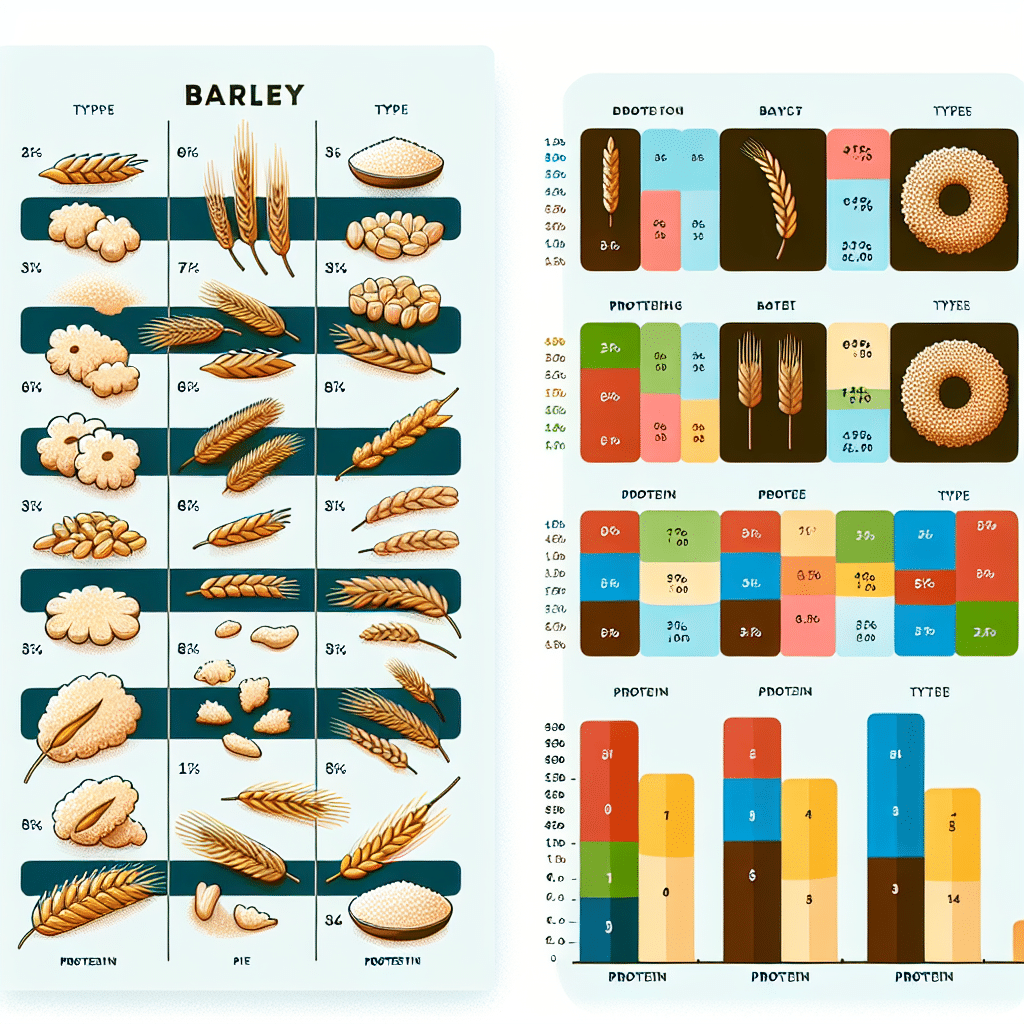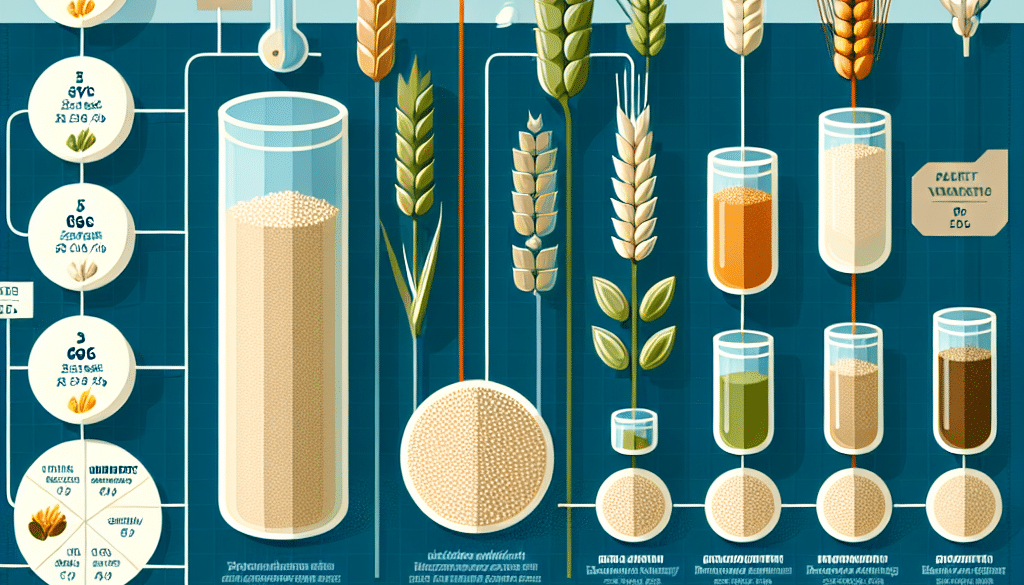Which Barley Has The Most Protein?
-
Table of Contents
- High-Protein Barley Varieties: Unveiling the Nutritional Powerhouses
- Understanding Barley and Its Protein Content
- Which Barley Has the Most Protein?
- Factors Influencing Protein Levels in Barley
- Comparing Barley Protein to Other Grains
- Case Studies and Research on High-Protein Barley
- Conclusion: The Quest for High-Protein Barley
- Discover ETprotein’s High-Quality Protein Products
High-Protein Barley Varieties: Unveiling the Nutritional Powerhouses

Barley is a versatile cereal grain that has been cultivated for thousands of years. It’s known for its rich, nutty flavor and its high fiber content, but it’s also a valuable source of protein. With the growing interest in plant-based diets and sustainable agriculture, understanding which barley varieties offer the most protein can help consumers and farmers alike make informed decisions. In this article, we’ll explore the protein content in different types of barley, the factors that affect protein levels, and how barley protein compares to other grains.
Understanding Barley and Its Protein Content
Barley comes in several forms, including hulled, pearled, and as malt. Hulled barley, also known as whole grain barley, has only the outermost hull removed and retains most of its nutritional value. Pearled barley, on the other hand, has been polished to remove the hull and bran, which reduces its fiber and nutrient content. Malted barley is primarily used in brewing and distilling industries.
When it comes to protein content, the type of barley is just one factor. The protein content can also vary based on the barley’s cultivar, growing conditions, and soil fertility. Generally, barley protein content ranges from 9% to 15% of its dry weight, making it a significant source of plant-based protein.
Which Barley Has the Most Protein?
Identifying the barley variety with the highest protein content requires looking at both traditional cultivars and modern hybrids. Research has shown that certain barley strains have been bred for higher protein content to meet the demands of various industries, such as animal feed and brewing.
- Feed Barley: Barley used for animal feed often has a higher protein content to meet the nutritional needs of livestock.
- Malt Barley: While malt barley requires a specific protein range to ensure proper fermentation, some malt varieties have been developed with higher protein levels.
- Food-Grade Barley: Barley intended for human consumption, such as in cereals and health foods, may also be selected for higher protein content.
It’s important to note that the highest protein barley varieties are often the result of targeted breeding programs. These programs aim to enhance not only the protein content but also other desirable traits such as yield, disease resistance, and climate adaptability.
Factors Influencing Protein Levels in Barley
The protein content in barley is not solely determined by the variety. Environmental factors and agricultural practices play a significant role in the nutritional profile of the grain.
- Soil Fertility: Soil rich in nitrogen tends to produce barley with higher protein content.
- Water Availability: Adequate irrigation or rainfall can influence the overall health of the barley plant and its protein levels.
- Harvest Timing: The stage at which barley is harvested can impact its protein concentration.
- Agronomic Practices: The use of fertilizers, crop rotation, and pest management can all affect the protein content of barley.
By optimizing these factors, farmers can enhance the protein content of their barley crops, regardless of the specific variety they are growing.
Comparing Barley Protein to Other Grains
When compared to other cereal grains, barley holds its own as a protein-rich option. Here’s how barley stacks up against some other common grains:
- Wheat: Wheat typically contains about 12-15% protein, similar to the higher end of barley’s protein range.
- Rice: White rice has a lower protein content at around 7%, while brown rice is slightly higher, making barley a better protein source.
- Oats: Oats have a comparable protein content to barley, often around 10-15%.
- Corn: Corn’s protein content varies widely but is generally lower than barley’s, averaging around 9%.
Barley’s protein is not only abundant but also contains essential amino acids necessary for human health, although it is not considered a complete protein as it is low in lysine.
Case Studies and Research on High-Protein Barley
Several studies have been conducted to identify and develop high-protein barley varieties. For instance, research at agricultural universities often focuses on breeding programs that select for both high yield and high protein content. These studies have led to the introduction of new barley cultivars that offer improved nutritional profiles and better adaptability to various climates and soils.
One such study might compare the protein content of different barley varieties grown under similar conditions to determine which has the highest protein yield per hectare. Another study might focus on the effects of fertilizer application rates on the protein content of a specific high-protein barley cultivar.
Conclusion: The Quest for High-Protein Barley
In conclusion, while there is no single barley variety that universally has the most protein, certain strains have been bred for higher protein content to serve specific industries. Factors such as soil fertility, water availability, and agricultural practices also play a crucial role in determining the protein levels of barley crops. Compared to other grains, barley is a competitive source of plant-based protein and can be an important part of a balanced diet.
For those interested in incorporating high-protein barley into their diets or agricultural practices, it’s essential to consider both the variety and the growing conditions to maximize the nutritional benefits of this ancient grain.
Discover ETprotein’s High-Quality Protein Products
If you’re looking for a reliable source of plant-based proteins, ETprotein offers a range of products that cater to various industries. Their selection includes organic rice protein, pea protein, and other seed-based proteins, all characterized by a neutral taste and non-GMO, allergen-free attributes. With L-(+)-Ergothioneine purity over 98%, ETprotein’s offerings are ideal for nutraceutical, pharmaceutical, and food and beverage applications. To learn more about their high-quality protein products, contact ETprotein today.
About ETprotein:
ETprotein, a reputable protein and L-(+)-Ergothioneine (EGT) Chinese factory manufacturer and supplier, is renowned for producing, stocking, exporting, and delivering the highest quality organic bulk vegan proteins and L-(+)-Ergothioneine. They include Organic rice protein, clear rice protein, pea protein, clear pea protein, watermelon seed protein, pumpkin seed protein, sunflower seed protein, mung bean protein, peanut protein, and L-(+)-Ergothioneine EGT Pharmaceutical grade, L-(+)-Ergothioneine EGT food grade, L-(+)-Ergothioneine EGT cosmetic grade, L-(+)-Ergothioneine EGT reference grade and L-(+)-Ergothioneine EGT standard. Their offerings, characterized by a neutral taste, non-GMO, allergen-free attributes, with L-(+)-Ergothioneine purity over 98%, 99%, cater to a diverse range of industries. They serve nutraceutical, pharmaceutical, cosmeceutical, veterinary, as well as food and beverage finished product distributors, traders, and manufacturers across Europe, USA, Canada, Australia, Thailand, Japan, Korea, Brazil, and Chile, among others.
ETprotein specialization includes exporting and delivering tailor-made protein powder and finished nutritional supplements. Their extensive product range covers sectors like Food and Beverage, Sports Nutrition, Weight Management, Dietary Supplements, Health and Wellness Products, and Infant Formula, ensuring comprehensive solutions to meet all your protein needs.
As a trusted company by leading global food and beverage brands and Fortune 500 companies, ETprotein reinforces China’s reputation in the global arena. For more information or to sample their products, please contact them and email sales(at)ETprotein.com today.












